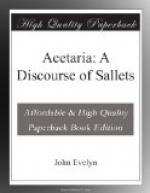The Ornithogalons roasted, as they do Chestnuts, are eaten by the Italians, the wild yellow especially, with Oyl, Vinegar, and Peper. And so the small tuberous Roots of Gramen Amygdalosum; which they also roast, and make an Emulsion of, to use in Broaths as a great Restorative. The Oxylapathum, us’d of old; in the time of Galen was eaten frequently. As also Dracontium, with the Mordicant Arum Theophrasti, which Dodonaeus teaches how to Dress. Nay, divers of the Satyrions, which some condited with Sugar, others boil’d in Milk for a great Nourisher, now discarded. But what think we of the Cicuta, which there are who reckon among Sallet Herbs? But whatever it is in any other Country, ’tis certainly Mortiferous in ours. To these add the Viola Matronalis, Radix Lunaria, &c. nay, the Green Poppy, by most accounted among the deadly Poysons: How cautious then ought our Sallet-Gatherers to be, in reading ancient Authors; lest they happen to be impos’d on, where they treat of Plants, that are familiarly eaten in other Countries, and among other Nations and People of more robust and strong constitutions? bessides the hazard of being mistaken in the Names of divers Simples, not as yet fully agreed upon among the Learned in Botany.
There are bessides several remaining, which tho’ Abdicated here with us, find Entertainment still in Foreign Countries: As the large Heliotrope and Sun-flower (e’re it comes to expand, and shew its golden Face) which being dress’d as the Artichoak, is eaten for a dainty. This I add as a new Discovery. I once made Macaroons with the ripe blanch’d Seeds, but the Turpentine did so domineer over all, that it did not answer expectation. The Radix Personata mounting with their young Heads, Lysimachia siliquosa glabra minor, when fresh and tender, begins to come into the Sallet-Tribe. The pale whiter Popy, is eaten by the Genouese. By the Spaniards, the tops of Wormwood with Oyl alone, and without so much as Bread; profitable indeed to the Stomach, but offensive to the Head; As is also Coriander and Rue, which Galen was accustom’d to eat raw, and by it self, with Oyl and Salt, as exceedingly grateful, as well as wholsome, and of great vertue against Infection. Pliny, I remember, reports it to be of such effect for the Preservation of Sight; that the Painters of his Time, us’d to devour a great quantity of it. And it is still by the Italians frequently mingled among their Sallets. The Lapatha Personata (common Burdock) comes now and then to the best Tables, about April, and when young, before the Burrs and Clots appear, being strip’d, and the bitterness soaked out, treated as the Chardoon,




